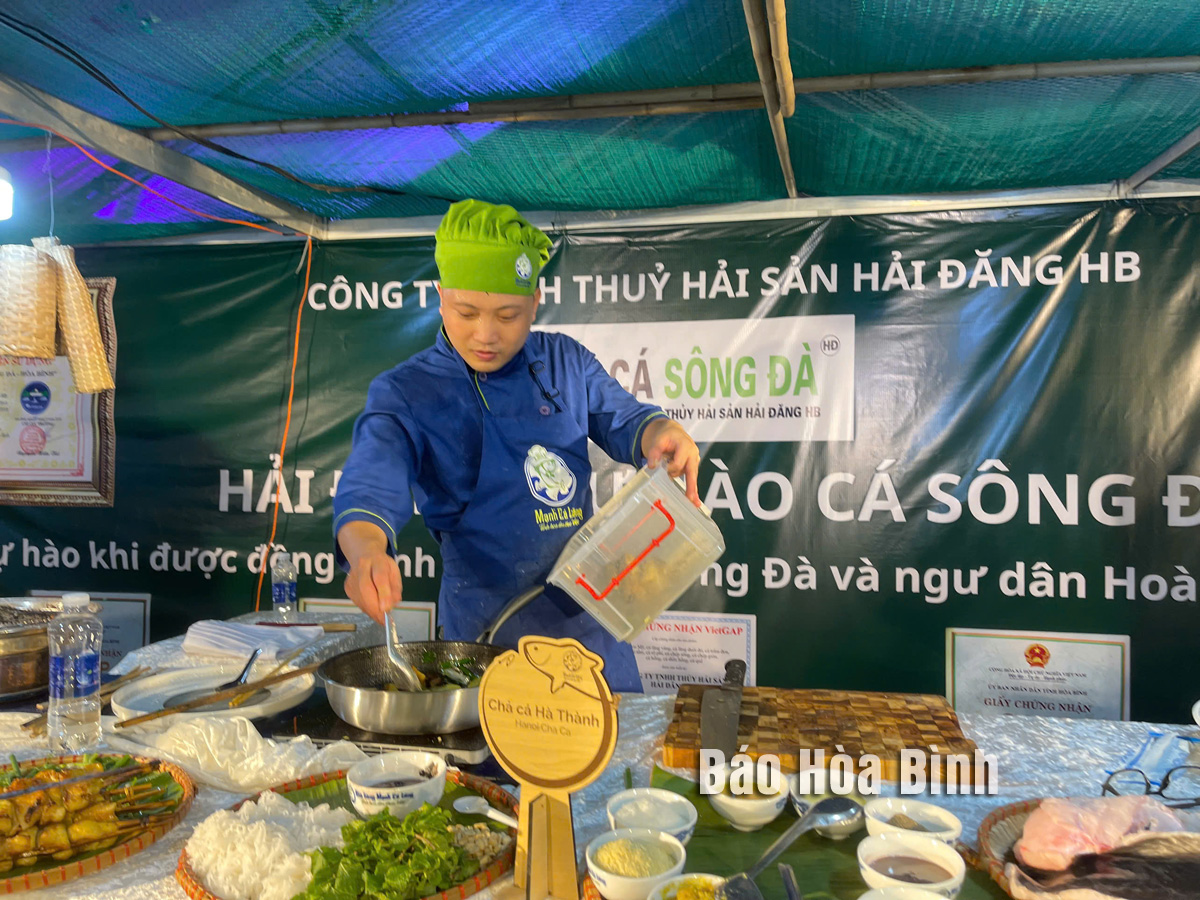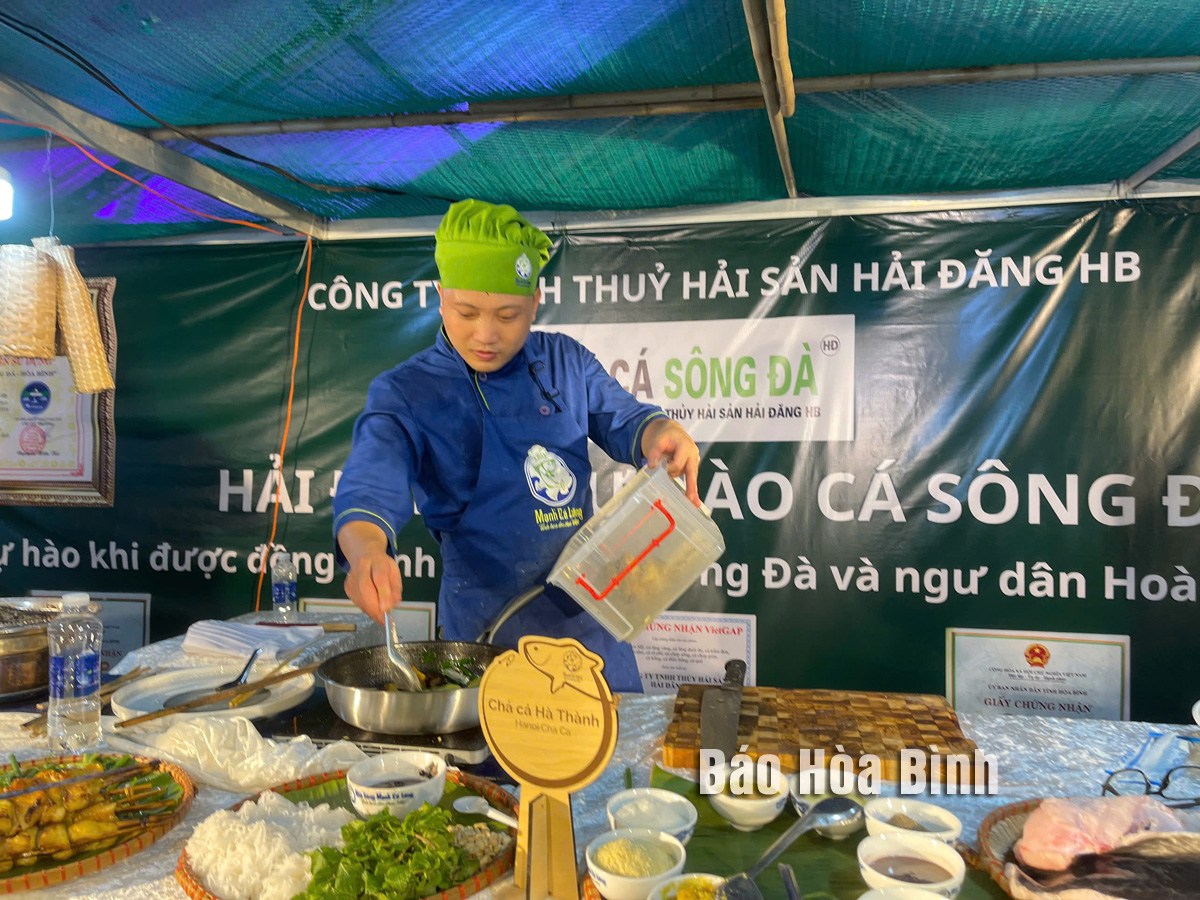
Hoa Binh province currently has 158 products granted at least three stars under the "One Commune, One Product” (OCOP) programme, including 114 food products. Among them, there are five aquatic products given four stars. They have gradually won consumers’ trust and created a new livelihood development trend for farmers and businesses in rural areas across the province.
The Hai Dang Fishery Products Co. Ltd. frequently
takes part in fairs in Hoa Binh province and other localities to market its
products made from the Da River’s fish.
Over the past years, aside from issuing support
policies for the sustainable development of cage fish farming and successfully
building the brands of "Ca Song Da - Hoa Binh” (Fish from the Da River - Hoa
Binh) and "Tom Song Da - Hoa Binh” (Shrimp from the Da River - Hoa Binh), the
province has stepped up the development of OCOP aquatic products, thus
practically benefiting product marketing and sale.
Fish farming has long been practiced in Tien
Phong commune of Da Bac district as five of this commune’s hamlets are adjacent
to the Hoa Binh hydropower reservoir. However, due to sale difficulties and
lack of access to scientific and technical advances, the activity was not a
main source of livelihood for local residents.
In early 2023, the Da Giang Eco Cooperative was
set up to boost production and sale connectivity among fish farming households
in Tien Phong, helping ensure stable income for many. The same year, the black
carp, black bagridae, and "ca ngach” (Cranoglanis bouderius) products from the
Da River were recognised as three-star OCOP products, giving further
encouragement to the development of cage fish farming here.
Director of the cooperative Xa Ngoc Hung said
the OCOP recognition has provided a more favourable condition for the
cooperative to market products. As a result, the value of products has been
increased, farmers’ income improved, and a sustainable development direction
created for local aquatic products.
There are currently 10 aquatic product
processing and preserving establishments in the province, comprising three
companies, one cooperative, and six business households. Meanwhile, Hoa Binh
now has five aquatic products (fish fillet and fish floss) granted four stars
under the OCOP programme.
Agricultural authorities said OCOP products are
assessed and classified according to the national criteria, which cover many
aspects such as quality, community value, cultural value, and production and
trading capacity of their owners.
Therefore, the sector is piloting some cage fish
farming models applying the VietGAP standards, developing more OCOP products to
improve quality and value, boosting connectivity among stakeholders under value
chains, and promoting concentrated and large-scaled production, said Luong
Thanh Hai, head of the sub-department of fisheries.
As of October 2024, there were 4,987 fish cages
across the province, expected to generate an output of 10,000 tonnes worth 600
billion VND (23.7 million USD) this year. Fourteen aquaculture establishments
with 1,067 cages have received VietGAP certificates, producing about 2.1 tonnes
of products each year.
Meanwhile, the annual amount of processed
aquatic products stands at about 850 tonnes, equivalent to just 11.33% of the
total farmed and caught output in Hoa Binh Lake, according to the
sub-department of fisheries.
According to data from the Hoa Binh Provincial Party Committee, the industrial production index for the first six months of 2025 is estimated to have increased by 20% compared to the same period last year. This marks the highest year-on-year growth rate for this period since 2020.
In the first six months of 2025, Hoa Binh province’s export turnover was estimated at 1.145 billion USD, marking an 18.11% increase compared to the same period in 2024. Import turnover was estimated at $ 804 million, a 17.15% increase, which helped the province maintain a positive trade balance.
The lives of the ethnic minority farmers in Tan Lac district have gradually improved thanks to the new directions in agricultural production. This is a testament to the collective strength fostered through the professional associations and groups implemented by various levels of the district’s Farmers’ Union.
With the motto the "product quality comes first,” after nearly one year of establishment and operation, Muong village’s Clean Food Agricultural and Commercial Cooperative, located in Cau Hamlet, Hung Son Commune (Kim Boi district), has launched reputable, high-quality agricultural products to the market that are well-received by consumers. The products such as Muong village’s pork sausage, salt-cured chicken, and salt-cured pork hocks have gradually carved out a place in the market and they are on the path to obtaining the OCOP certification.
In the past, the phrase "bumper harvest, rock-bottom prices" was a familiar refrain for Vietnamese farmers engaged in fragmented, small-scale agriculture. But today, a new spirit is emerging across rural areas of Hoa Binh province - one of collaboration, organisation, and collective economic models that provide a stable foundation for production.
Maintaining growing area codes and packing facility codes in accordance with regulations is a mandatory requirement for agricultural products to be eligible for export. Recently, the Department of Agriculture and Environment of Hoa Binh province has intensified technical supervision of designated farming areas and packing facilities to safeguard the "green passport" that enables its products to access international markets.



